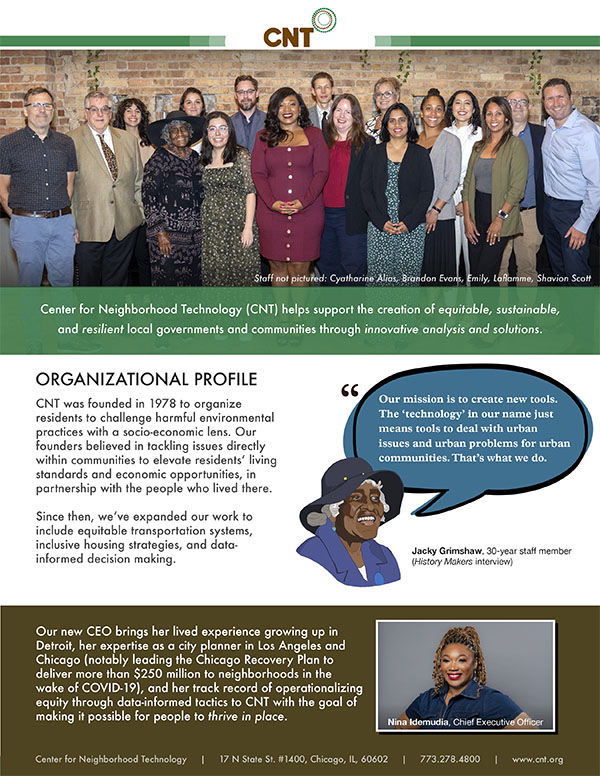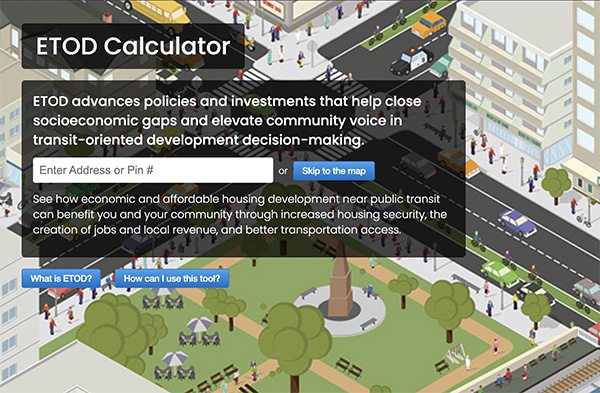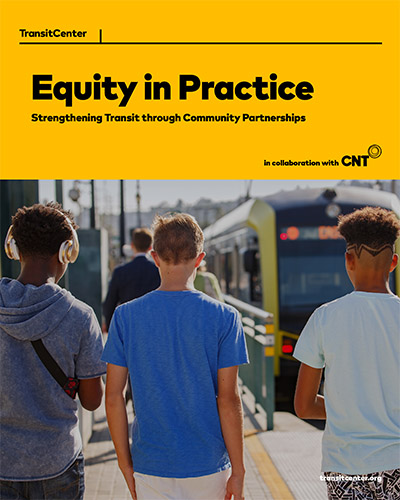
Climate & Cultural Resilience program is now Nature Near Transit
Dedicated volunteer garden stewards gathered at Overton Center for Excellence in Bronzeville on the first day of fall, Saturday, September 23 to bring new life to the rain garden located on the east edge of the former elementary school property, an 8-minute stroll from the 51st Street Green Line station. Through our Climate and Cultural Resilience program, recently renamed Nature Near Transit to better capture the essence of the work, CNT helped establish the east-... Read the rest of this entry »
LVEJO + CNT fair features food, fun, and water justice
Chicago finally caught a weekend break from torrential thunderstorms and poor air quality coming from Canadian forest fires on Saturday, July 22—making it a great day for the Water Justice Fair that Little Village Environmental Justice Organization (LVEJO) and Center for Neighborhood Technology co-hosted at Las Semillas de Justicia Garden. The event was one of the first post-pandemic in-person gatherings for our two groups. Las Semillas de Justicia Garden was a... Read the rest of this entry »
With new civic innovation hub, south suburban leaders focus on ‘technology of getting things done’
“We always think it’s going to be a big movement, a big force, something that’s beyond ourselves that’s going to be our solution when in fact, it’s us– the moms, the grandmoms, the kids,” Lorée Washington, a Riverdale community leader, said during a recent virtual workshop for residents of South Suburban communities where the RainReady project is addressing urban flooding. As we partner with local groups to develop the RainReady Calumet Corridor with support from the Cook County government,... Read the rest of this entry »
Equitable Green Stormwater Infrastructure is happening all over Chicago
If you had a chance to press pause, reflect, and bask for a moment in the great work you and your team, partners, and funders achieved, what would that carefully curated day look like? Inspired by a request from Kresge Foundation Environment Program Officer Yeou-Rong Jih, we took an equitable green stormwater infrastructure tour in Chicago – a reunion for many who had not been together since before the pandemic – from an idea to reality on Tuesday, April 11. Even the weather and... Read the rest of this entry »
Southeast Side Climate Impacts: Quantitative data without community input misses the full story
Climate change impacts are felt by individuals and communities all over the world through intense or frequent storms, floods, and increased exposure to air and water pollutants. Who is most impacted by this? Unfortunately, those who are lower-income and have non-white racial or ethnic identities. Chicago’s Southeast Side is one of these communities. Here, residents experience health inequities from their proximity to industrial pollution, like higher rates of heart disease and respiratory... Read the rest of this entry »
Urban Flooding Baseline Tool Explores the ‘Where’ and ‘Why’ of Urban Flooding, and Who Is Most Impacted
CNT’s exploration of urban flooding CNT has worked on urban flooding for several years, focusing specifically on urban flooding because of the realities in Chicago and Illinois more broadly. FEMA's Flood Insurance Rate Maps create floodplains based on flooding from bodies of water. But based on personal experiences and relationships with residents and local professionals, CNT knew that many homes in the Chicagoland area are impacted by flooding despite being outside of flood plains. CNT... Read the rest of this entry »
From Screen Time to Real Time: Understanding Southeast Side stories through today's oral histories
As data analysts and policy professionals, we spend a lot of time at our desks and behind screens, analyzing quantitative data, active or proposed policies and programs, and various written reports and documents. Much of what we analyze and review is -- or becomes -- an aggregation and anonymization of specific places, experience, and impacts, and fails to directly capture the intricacies of an individual’s lived experience. In our work with community-based partners, we’ve committed... Read the rest of this entry »
The Problems With the justice40 Screening Tool, and Some Ideas for How to Improve It
The Center for Neighborhood Technology (CNT) has been a strong supporter of the concept of Justice40 since its announcement in early 2021. The goal of this program is to direct at least 40% of the benefits of federal investment to communities that have historically been left behind. Defining those communities is critical, and the federal government attempted this with the release of the Climate and Economic Justice Screening Tool in February 2022. Generally, the federal definition of... Read the rest of this entry »
How Green Infrastructure Affects Home Values in New Orleans
Green stormwater infrastructure (GSI) is an important tool to build resilience to climate change but needs community support to be effective. In late February, as part of CNT’s continued work to examine the effect of GSI on property values, I joined Leslé Honoré, Managing Director of Strategy and Communications, to discuss this topic with the community of Gentilly in New Orleans. In partnership with Father Tony Ricard and St. Gabriel the Archangel Church, we had the incredible... Read the rest of this entry »
Authentic Collaboration: Critical to Equitable Outcomes
Little Village Environmental Justice Organization (LVEJO), an environmental justice (EJ) organization based in the Little Village neighborhood, and Center for Neighborhood Technology (CNT), a research and data analytic planning organization in Chicago, are creating a Geographic Information Systems (GIS) 101 Toolkit for EJ organizations to help them conduct basic mapping and analysis. Throughout toolkit development, the Milwaukee-based EJ organization Milwaukee Water Commons (MWC) is testing to... Read the rest of this entry »





 Strengthening Transit Through Community Partnerships
Strengthening Transit Through Community Partnerships



















 RSS Feed
RSS Feed